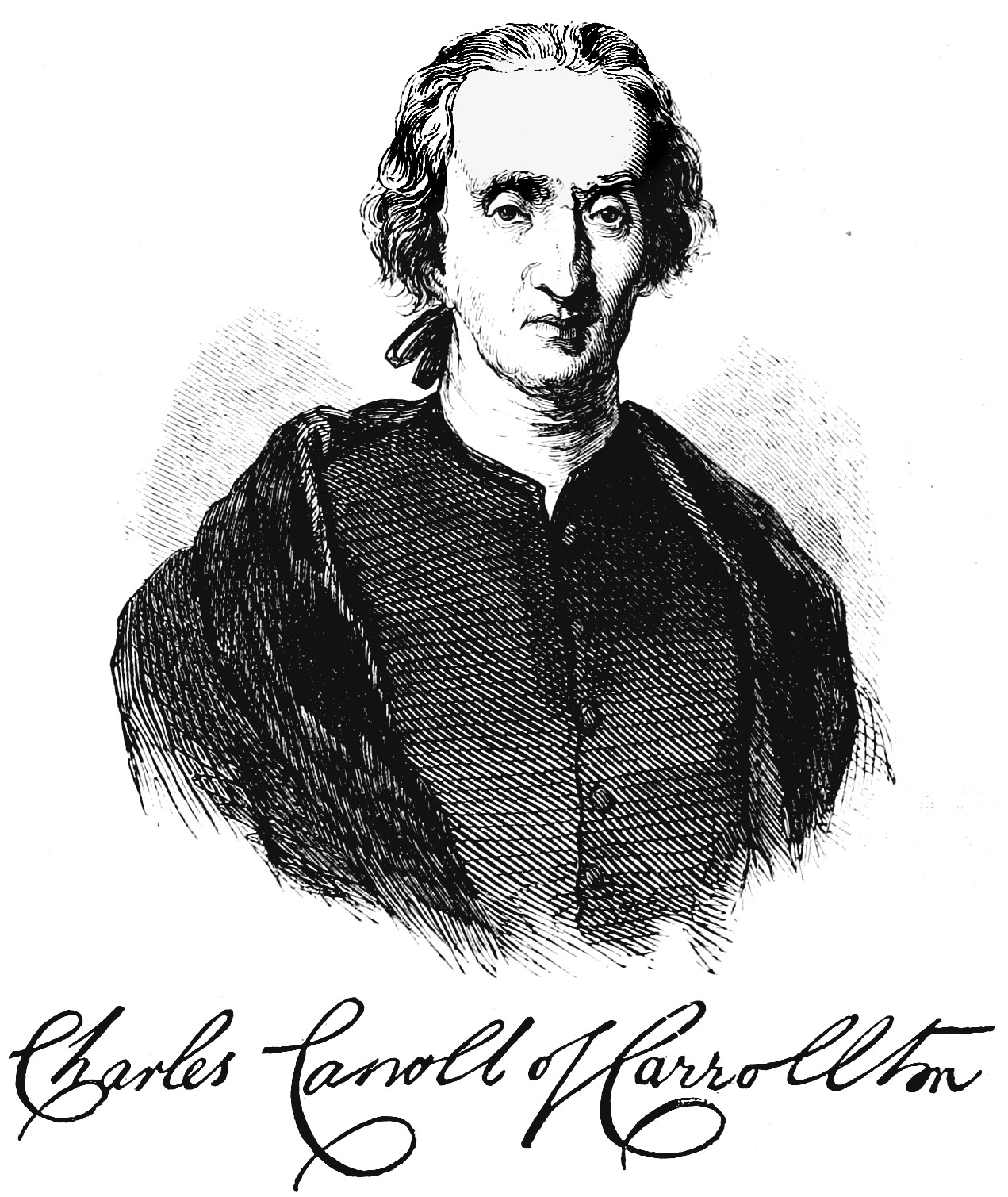CHARLES CARROLL.
THE last survivor of the glorious company of those who signed the Declaration of Independence, was Charles Carroll, who to enable the British ministers to identify him as an arch-rebel, and not mistake his cousin of the same name, added - “of Carrollton” to his signature on that great instrument. He was of Irish decent 1, and was born at Annapolis, in Maryland, on the 20th of September, 1737. His father was a Roman Catholic gentleman of large fortune, and sent Charles to the Jesuits' College at St. Omer, in France, when he was eight years of age. There he remained six years, when he was transferred to another seminary of learning at Rheims. He was graduated at the College of Louis the Grande at the age of seventeen years. He then commenced the study of law at Bourges, remained there a year, then went to Paris and studied until 1757, and finally completed his professional education in London. After an absence of twenty-two years, he returned to Maryland, in 1765, a finished scholar and well-bred gentleman. He found his countrymen in a state of high excitement on account of the Stamp Act, and at once espoused the popular cause with great zeal. He held a fluent and powerful pen; and as early as 1771, Mr. Carroll was known throughout the colonies as an able advocate of popular liberty.
In 1772, he engaged in an anonymous newspaper discussion with the secretary of the colony, in which he opposed the assumed right of the British government to tax the colonies without their consent. The unknown writer was thanked by the Legislature, through the public prints, for his noble defence of popular rights. When the author became known, he was at once regarded as the favorite of the people.
Mr. Carroll early perceived, and fearlessly expressed the necessity of a resort to arms, and he was among the most zealous advocates for the political independence of the colonies, even before that question assumed a tangible form in the public mind. He was chosen a member of the first committee of safety, at Annapolis, and in 1775, took his seat in the Provincial Congress. The Maryland convention had steadily opposed the sentiment of independence which was taking hold of the public mind, and that fact accounts for the delay in sending Mr. Carroll to the Continental Congress. He visited Philadelphia early in 1776, and Congress appointed him one of a committee, with Dr. Franklin and Samuel Chase, to visit Canada on a political mission 2. Soon after his return, the views of the Maryland convention having changed, he was elected to a seat in the Continental Congress, too late to vote for independence, on the 4th of July, but in time to affix his signature to the instrument on the 2d of August. Ten days afterward he was appointed a member of the Board of War, and held that position during the remainder of his service in Congress. He assisted in framing a constitution for his native State, in 1776, and in 1778, he left the national council to take a more active part in the public affairs of Maryland. He was a member of the Maryland Senate, in 1781, and in 1788, he was elected one of the first senators from that State in the Federal Congress. There he remained two years, when he again took his seat in his State Senate, and retained it for ten consecutive years. He then retired from public life, at the age of sixty-four years, and in the quiet seclusion of a happy home he watched with interest the progress of his beloved country for more than thirty years longer. When Adams and Jefferson died, in 1826, Mr. Carroll was left alone on earth, in the relation which he bore to his fifty-five colleagues who signed the Declaration of Independence. He lived on, six years longer, an object of the highest veneration; and finally, on the 14th of November, 1832, his spirit passed peacefully and calmly from earth, when he was in the ninety-sixth year of his age.
1. His grandfather, Daniel Carroll, was a native of Littemourna, in Ireland. He was a clerk in the office of Lord Powis, and under the patronage of the third Lord Baltimore, principal proprietor of Maryland, he emigrated to that colony in the reign of James II.
2. See sketch of Archbishop Carroll.
